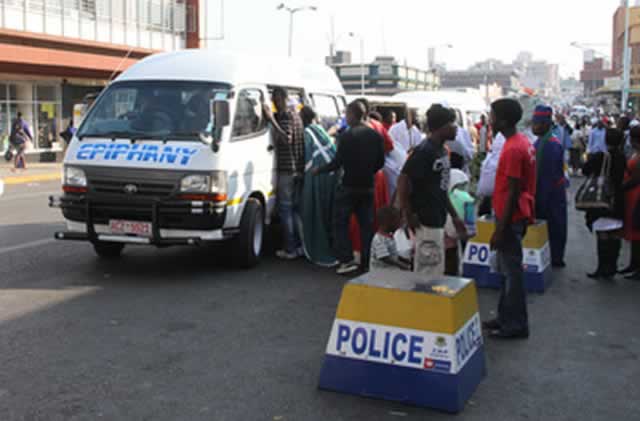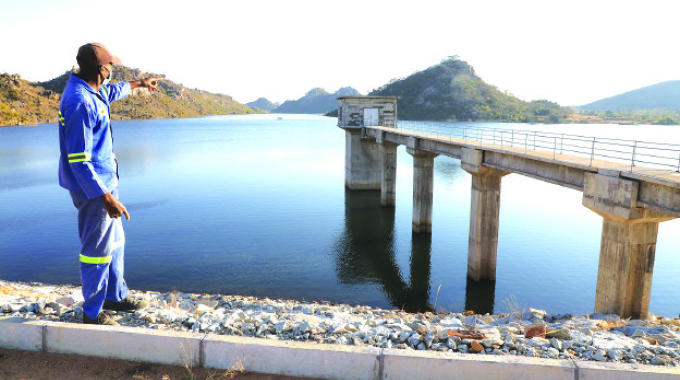In praise of the village community spirit
Sekai Nzenza on Wednesday
We have a community crisis at the nutrition garden right next to the village bush pump. Our vegetable garden is dry and empty because people are fighting over how and who should work in the community garden. About 50 or more people who form one group of the Simukai project this side of the mountain near my homestead are gathered here to resolve the crisis.
Some people do not want to work as a community anymore because they say others are not pulling their weight.
But, some of us still think we can work together in one big group because we are a community with the same beliefs and values of hard work. Why call ourselves a community development project if we do not work as a community? Globally, thousands of books have been written about African poor people and how empowerment can help build self-confidence and sustainable food production in rural communities. We are a community.
When I came back to this village after many years working for NGOs overseas and within Africa, I brought back new knowledge about community-based organisations. I was full of renewed energy, wanting to help my relatives and the rest of the community back here, doing real development in my own village.
I was no stranger to this place. I was born down by the river, in the old ruins, kumatongo, and right next to the anthill with the big thorny mudzambiringa tree. I know the exact spot where the kitchen hut of my birth used to stand. The umbilical cord was buried by my grandmother Mbuya VaMandirowesa somewhere around there as well.
This is my village and they all know me around here.
Three years ago, the Simukai project borehole was drilled as part of the Australian Ambassador’s direct aid programme. A similar grant also funded the drilling of the Simukai Nyati bush pump 40 kilometres away. There was much celebration when water was available and the communities grew vegetables, onions and tomatoes.
Now we are in our third year. But we have a problem. There is a major conflict at Simukai. Most of people from many villages around here are refusing to be called a community of people who work alongside each other in the garden.
They want as individuals, the same way Simukai Nyati has managed to do when they got a bush pump. Over there, each individual was allocated a small piece of land by the project committee to develop three garden beds. During the past two years, there was a competition to grow the best tomatoes and the best vegetables. There is no shortage of garden produce at Nyati. But here, in my own village, where we have plenty of water, there is an empty garden. What went wrong with the community spirit of working together for the greater public good?
We are all sitting under shade of the big leafy muchakata tree next to the bush pump. The women have their wrap around cloths spread out on the grass, legs stretched out. On the other side of the muchakata tree are a few men. I can count them on my hand because they are less than ten, including sabhuku, the village kraal-head. At these development meetings, you often find more women than men. Ever since independence, the number of men has continued to decrease around here and also in many villages across the Save River. Before the antiretroviral drugs came, many people, mostly men, died from HIV and AIDS. Others migrated to the cities to look for work.
This was then followed by the land resettlement programme and more men left. But we still have a few men left, including Jemba, our neighbour from up the hill who is sitting next to my brother Sidney. In between smoking a tobacco wrapped in newspaper, Jemba is chewing the bark of a tree, gavi, and turning his head to spit out the brown saliva. Gavi is good for the teeth. But Jemba should have chewed masses of that stuff before he lost most of his front teeth.
There is a serious argument going on. Some people are saying the garden should continue to be managed on an individual basis, each one working on their patch of land. Others are saying the garden belongs to the whole community and we should not work as individuals. The dissent here speaks of a broken community.
A long time ago, we were a strong community of people living as subsistence farmers working on the less than fertile lands allocated to us by the Rhodesian government. Our rules and standards were governed and controlled by the chiefs and by the spirits of our dead ancestors. Sometimes people worked alone as family units and when there was too much work, an individual called for a nhimbe.
In those days, nhimbe was the communal system of helping each other work in the fields. At the beginning of the rainy season, there was a nhimbe to plough the fields. Neighbours brought their yoked cattle and a plough. My mother pointed the field to them. In no time at all the fields were all ploughed while the women and other men sowed the maize. At midday, they rested and drank mahewu, the non-alcoholic drink. By late afternoon the neighbours were already back in their own fields. At weeding time, the nhimbe practice was the same except this time the neighbours worked longer hours with the young men competing to finish weeding the weeds in between rows of maize or peanuts. At sunset the adults drank beer and sometimes they danced.
Then came the festival of the jakwara, the dry season communal rapoko threshing and winnowing harvest. During the jakwara ceremony some village secrets came out and they stopped being secrets. Although children were not allowed to attend jakwara, we waited until a lot of beer had been consumed and the adults sang songs with heavy candid sex language. They swore, danced, laughed and spoke dirty jokes to each other.
They spoke openly about adultery, infertility and other taboo subjects that were disrupting village peace, including serious cases of murder, witchcraft, incest and rape. What happened at the jakwara stayed at the jakwara. No offence was to be carried back to the village. Jakwara was a communal system for the good of the whole community.
But that was a long time ago.
As the arguments under the muchakata tree continued, some people said the garden should be handed over to the Mugodhi Apostolic Church or the Manhango Bethsaida Church. Then the Catholics said no, the garden was in the area dominated by people from their congregation.
Since I was the so-called learned development worker responsible for writing the proposal that had been awarded the grant for the bush pump and the fence, sabhuku said I should also say something on how the garden was to be managed. Should it be run by a church-based organisation or by the village committee? I took a few people aside to consult, as you should when big decisions are to be made at any level. My brother Sidney said we should vote for a new committee. Then my cousin Piri said committees never worked for long in the village because people did not know what a constitution was. “Take back your garden and hire people to work in it. Make it a business,” said Piri. “If community empowerment worked, everyone will be powerful and well fed by now.” Sidney ignored her.
As we walked back to the group, Piri nudged me and whispered that our people were no longer a community and they should not be allowed to make any decisions at all.
“Just tell them what to do and pay them for the jobs they do well. Finish.”
No decision was made on the way forward for the garden. Another meeting is scheduled for this coming Saturday, back at the muchakata tree. Meanwhile, the garden is empty and the people have no vegetables.
On the way back to Harare, we stopped at the small bridge not too far from the village. The pile of rocks that had been sitting like a pyramid on the road side for two years had fallen on to the main road. No car or kombi could pass. I pulled the car to the side and asked Piri and our neighbour Jemba, who was coming to Harare with us, to help move the stones off the road. Piri and Jemba moved a few stones, making enough room for my car to pass. Then they climbed back into car leaving some rocks on the road still. I called out to say, hey, get out of the car and finish picking up all the stones because any other car bigger than mine could not pass. The stones were still a dangerous hazard for any driver, especially at night.
They both looked at me with amusement. Jemba laughed and said the road should really be fixed by people with cars. For a poor man like him who will never own a car, why would he break his back picking stones so that other people’s nice cars could pass? Because kombi drivers charge a lot of money for using the public roads, they should be paying rates to each village kraal-head whose land they drive through. Piri said the kombi drivers cannot not afford that.
“So, whose responsibility is it to fix the roads unless we all do it?” I asked. Suddenly I felt a strong sense of duty towards the community. In Latin, it was the feeling of civitas, the law that binds us together so we can perform the community activities for the public good, a concept similar to the African hunhu, ubuntu or humanness.
Jemba stepped out of the car. Instead of helping move the stones, he stripped the bark of a tree, sat on a rock, chewed the bark and spat. He said, “Haa, you speak of village community spirit as if it still exists the way it used to be. It’s dying every day.”
Dr Sekai Nzenza is the Chief Executive Officer of Rio Zim Foundation. She writes in her personal capacity.








Comments